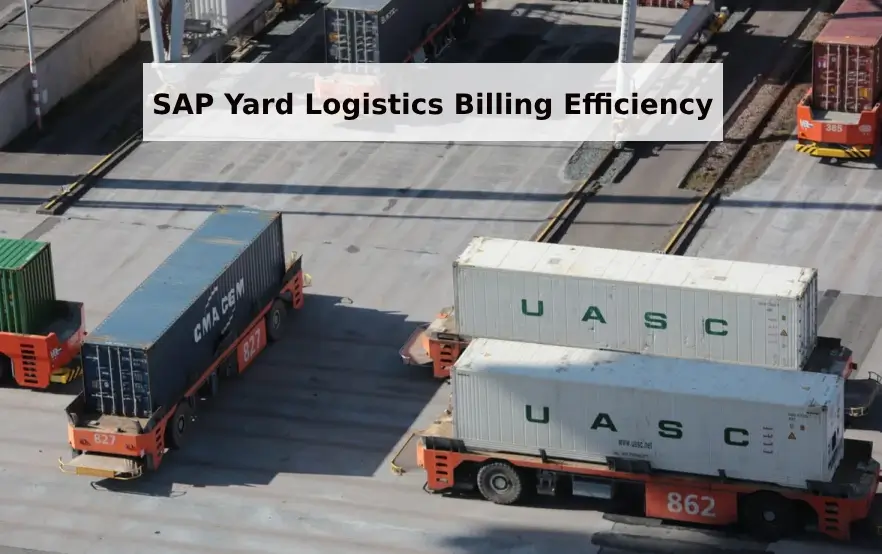
Introduction:
Accurate financial reporting and streamlined supply chain operations heavily rely on effective billing and transaction recording. This piece delves into the significance of yard billing and its execution through SAP Yard Logistics.
Significance of Billing and Transaction Recording:
Precise billing and transaction recording play a pivotal role in efficient inventory management, mitigating stockouts, and minimizing carrying costs. Additionally, they contribute to streamlined order processing and fulfillment by capturing sales and shipment information accurately, tracking orders, and ensuring prompt and precise invoicing.
Billing Procedure within SAP Yard Logistics:
Yard Logistics compiles essential data for generating invoices related to various yard tasks and directs them to the relevant stakeholders. Through seamless integration with SAP Extended Warehouse Management and SAP Transportation Management, it simplifies the billing process for all billable activities taking place within the yard.
Yard Planning in SAP TM:
Upon the arrival or departure of freight orders, they are transformed into yard orders that encompass crucial details regarding associated yard activities, such as asset movement, cleaning, and weighing. Each activity type can be linked to a suitable warehouse process type within SAP EWM for effective mapping.
Corresponding Warehouse Tasks in SAP EWM:
Every yard task for an asset in the yard has a corresponding warehouse task in SAP EWM, which is logged for the TU. When a task with all the activities is carried out in the yard, it generates corresponding warehouse tasks for each activity of the TU.
Invoice Generation for Yard Tasks:
SAP EWM features a report named ‘Warehouse Task Snapshot’ that provides regular billing insights. This report enables the billing of completed and confirmed yard tasks to the corresponding customers, considering the agreed-upon rate.
The rate is derived from the agreement stored in the SAP TM Agreement Management System and is subsequently transmitted to SAP EWM to initiate warehouse billing processes. The billing data is then transferred to SAP TM for charge calculation or can be directly invoiced within SAP ERP.
Freight Agreements and Warehousing Billing:
Freight agreements serve as a means to determine the carrier’s charges, and warehousing billing encompasses the invoicing of all yard activities associated with the shipper. By leveraging freight agreements, the carrier’s charges can be accurately calculated.
Similarly, warehousing billing enables the systematic invoicing of various yard activities tied to the shipper. The forwarding agreement, which outlines the negotiated price with the customer, plays a vital role in facilitating transparent and precise billing processes.
Lining Yard Management with SAP YL Activity-based Billing
Yard management can be a complex undertaking, especially when it comes to billing. However, with SAP Yard Logistics (YL), activity-based billing is possible, making it easier for organizations to accurately bill customers and capture the full cost of yard operations.
Activity-Based Billing with SAP YL:
SAP YL allows organizations to classify yard activities and assign unique billing rates to them. For example, the cost of storing products could be assessed differently from the cost of loading or unloading. This way, activity-based billing rates can be set up, allowing organizations to guarantee accurate billing based on actual yard operations.
Automated Billing Processes:
By implementing SAP YL, organizations can streamline their billing processes, minimize manual labor, and reduce errors. This automated system efficiently collects essential data, including activity time, equipment utilization, and resource consumption, to generate invoices according to predefined billing criteria. Automation eliminates the need for laborious manual calculations, ensuring accurate billing and significantly reducing the risk of inconsistencies.
Benefits of SAP YL Yard Billing:
Organizations can ensure precise and transparent invoicing, minimize billing discrepancies, and enhance customer satisfaction by leveraging the yard billing functionalities offered by SAP YL. This system provides cost transparency, empowering businesses to identify areas of inefficiency and proactively optimize yard processes. By effectively tracking activities and resources, organizations can achieve cost savings.
Furthermore, SAP YL enhances financial management by expediting payment collection, improving cash flow, and fostering stability and profitability. Leveraging the reporting and analytics capabilities of SAP YL, businesses gain valuable insights into yard operations. This enables them to enhance yard performance by analyzing billing data, evaluating key performance indicators (KPIs), and making data-driven decisions to drive continuous improvement.
Improving Yard Management Efficiency with SAP YL:
By adhering to best practices and utilizing SAP YL billing capabilities, firms can streamline their yard operations, reduce manual labor, and acquire insightful data through reporting and analytics. Adopting SAP YL yard billing is crucial to improving customer satisfaction and obtaining operational excellence in logistics and supply chain.
Conclusion:
SAP YL activity-based billing offers a comprehensive solution to the complex challenges of yard logistics. By harnessing the power of SAP YL, organizations can optimize their operations, improve efficiency, and reduce costs. SCM Champs provides extensive expertise in SAP yard logistics, making us a trusted partner for organizations seeking to unlock several business benefits with SAP YL. Speak to our experts today to learn more.


